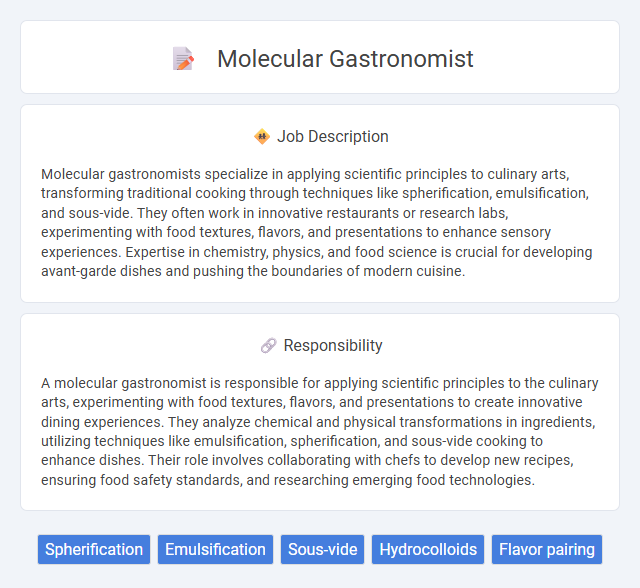
Molecular gastronomists specialize in applying scientific principles to culinary arts, transforming traditional cooking through techniques like spherification, emulsification, and sous-vide. They often work in innovative restaurants or research labs, experimenting with food textures, flavors, and presentations to enhance sensory experiences. Expertise in chemistry, physics, and food science is crucial for developing avant-garde dishes and pushing the boundaries of modern cuisine.
Individuals with strong creativity, a passion for science, and excellent attention to detail are likely suitable for a career as molecular gastronomists. Those comfortable working in fast-paced, experimental environments and capable of blending culinary arts with scientific principles may find this role rewarding. However, people who prefer routine tasks or lack patience for trial-and-error processes might struggle to thrive in this field.
Qualification
A molecular gastronomist typically holds a degree in culinary arts, food science, chemistry, or a related field, with advanced knowledge in food physics and chemistry essential for innovative cooking techniques. Proficiency in laboratory skills, sensory evaluation, and the use of specialized equipment such as centrifuges, liquid nitrogen, and sous-vide machines enhances experimental cuisine development. Strong analytical skills combined with creativity enable molecular gastronomists to transform traditional recipes through scientific principles, demanding continuous learning in food technology and ingredient interactions.
Responsibility
A molecular gastronomist is responsible for applying scientific principles to the culinary arts, experimenting with food textures, flavors, and presentations to create innovative dining experiences. They analyze chemical and physical transformations in ingredients, utilizing techniques like emulsification, spherification, and sous-vide cooking to enhance dishes. Their role involves collaborating with chefs to develop new recipes, ensuring food safety standards, and researching emerging food technologies.
Benefit
Molecular gastronomists likely enhance culinary experiences by merging science with cooking techniques, leading to innovative textures and flavors. This specialization probably increases restaurant appeal and customer satisfaction through unique presentations. Employing a molecular gastronomist can potentially boost a dining establishment's reputation and profitability.
Challenge
Molecular gastronomists likely face the challenge of balancing scientific precision with creative culinary experimentation. Developing innovative dishes that maintain appeal while ensuring safety and consistency may require extensive trial and error. The complexity of integrating chemistry and food science could demand continuous learning and adaptation to emerging techniques.
Career Advancement
Molecular gastronomists enhance culinary experiences through scientific techniques, driving innovation in food texture and flavor. Career advancement often involves transitioning from kitchen roles to research and development positions in leading restaurants or food technology companies. Expertise in food chemistry, strong problem-solving skills, and collaboration with chefs and scientists accelerate professional growth in this niche culinary field.
Key Terms
Spherification
A molecular gastronomist specializing in spherification expertly transforms liquids into delicate, caviar-like spheres using calcium and sodium alginate, enhancing both texture and presentation in culinary dishes. Mastery of this technique allows chefs to create unique sensory experiences by encapsulating flavors in gel-like membranes that burst upon consumption. Expertise in chemical reactions and precise control over ingredients is essential to successfully execute spherification and innovate in modern gastronomy.
Emulsification
Molecular gastronomists specialize in the scientific study of food transformations, with emulsification being a key technique that combines immiscible liquids like oil and water into stable mixtures using emulsifiers such as lecithin or xanthan gum. Mastery of emulsification allows culinary professionals to develop novel textures and flavors, enhancing dishes with innovative sauces, foams, and dressings. Expertise in controlling factors like droplet size and phase dispersion is critical for achieving desired consistency and mouthfeel in modern gastronomy.
Sous-vide
Molecular gastronomists specializing in sous-vide techniques utilize precise temperature control to enhance food texture, flavor, and nutritional retention. Expertise in vacuum-sealed cooking processes enables consistent results and innovative culinary creations. Mastery of scientific principles and advanced kitchen technologies is essential for optimizing sous-vide applications in fine dining and food research.
Hydrocolloids
Molecular gastronomists specializing in hydrocolloids utilize substances like agar, xanthan gum, and carrageenan to manipulate texture and consistency in culinary creations, enhancing sensory experiences. Expertise in hydrocolloid chemistry allows them to innovate dishes by controlling gelation, emulsification, and thickening processes. This role demands a deep understanding of food science, sensory analysis, and advanced cooking techniques to transform traditional ingredients into novel gastronomic textures.
Flavor pairing
Molecular gastronomists specialize in analyzing chemical compounds in ingredients to create innovative flavor pairings that enhance culinary experiences. They utilize scientific techniques such as spherification, emulsification, and sous-vide to combine contrasting or complementary flavors in unexpected ways. Expertise in flavor pairing algorithms and sensory analysis tools enables precise formulation of dishes that appeal to multiple taste receptors simultaneously.
 kuljobs.com
kuljobs.com